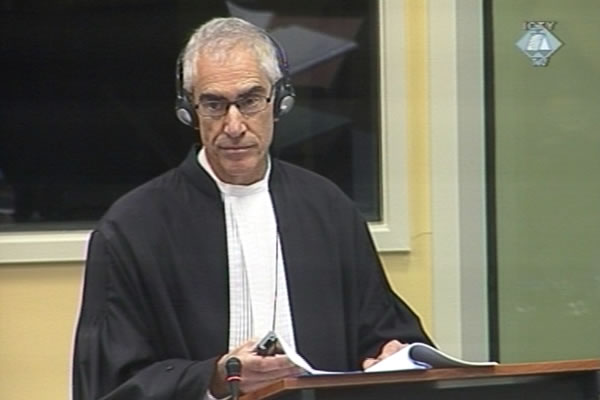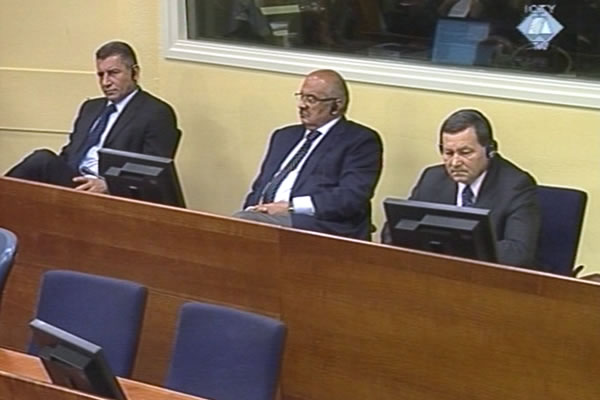Home
PROSECUTION: ‘CRIMES ARE CONTROVERSIAL, NOT OPERATION STORM’
In the closing argument at the trial of generals Gotovina, Cermak and Markac, the prosecution insisted that it never claimed that the Republic of Croatia had a plan or a policy to expel the Serbs from Krajina. It was done by Croatian officials involved in the joint criminal enterprise, headed by President Tudjman, in which the three accused played a part
 Alain Tieger, prosecutor at the Ante Gotovina, Ivan Cermak and Mladen Markac trial
Alain Tieger, prosecutor at the Ante Gotovina, Ivan Cermak and Mladen Markac trial The decision to launch Operation Storm is not controversial; what is controversial, however, is ‘the successful effort’ of some Croatian officials headed by President Franjo Tudjman to ‘exploit the circumstances’ and implement the plan to eliminate Serbs from Krajina. US prosecutor Alain Tieger put this forth in the first part of the closing argument at the trial of generals Ante Gotovina, Ivan Cermak and Mladen Markac. As Tieger insisted, he and his colleagues never claimed that the Republic of Croatia had a plan or a policy to expel people: it was the participants of the joint criminal enterprise, including the three accused, who did.
According to the prosecution, the removal of the Serbs from Krajina as a goal of the joint criminal enterprise was formulated on 31 July 1995 at a meeting of President Tudjman with high-ranking officials loyal to him at Brijuni. The prosecutor reminded the Trial Chamber of Tudjman’s words at the meeting: Serb civilians were to be offered ‘an escape route’, while at the same time ‘their human rights were to be purportedly guaranteed to them’ in the hope that the Krajina army would follow in their wake. As Tieger said, Tudjman was against multi-ethnic states and was in favor of an ethnically homogenous Croatian state without Serbs. He did so openly, before international representatives. The Croatian president called Serbs ‘a canker in Croatia’s stomach’, whose spread was to be prevented by Operation Storm.
Once Serbs were expelled from Croatia, everything was done to prevent their return: their property was either destroyed or confiscated and they were physically prevented from returning. Tudjman ‘was proud of what had been done’, the prosecutor said, bringing up Tudjman’s words at the first anniversary of Operation Storm. ‘Knin was brought back under Croatia’s wings, as pure as it was in King Zvonimir’s time’, he had said. In other words, forcible and permanent elimination of Serbs from Krajina – set as a goal of the joint criminal enterprise – was achieved.
After Tieger completed his presentation, his colleagues picked up to address the elements of the joint criminal enterprise and the role the accused had played in it. Prosecutor Russo stressed that the expulsion of the Serbs – planned at the Brijuni meeting – was to be implemented by a combination of indiscriminate artillery attacks and psychological pressure. On 2 August 1995, Gotovina ordered the shelling of the towns of Knin, Obrovac, Gracac and Benkovac, the prosecutor noted. To avoid the response of the international community, the Croatian Army resorted to ‘moderate unlawful attacks’: the aim was to scare the people and make them flee, while avoiding too much damage to the towns and villages. The prosecution rejected the defense’s claim that the Serb civilians fled because the Krajina leadership ordered them to evacuate; the population was in a panic even before the decision was issued, the prosecution noted. Moreover, many civilians were unaware of the decision.
According to prosecutor Hederaly, one of the goals of the joint criminal enterprise was to burn down and loot houses in Krajina and thus force the remaining Serbs to leave and to prevent those who had left from returning. In the course of Operation Storm and in its aftermath, the international staff reported that about 60 to 90 percent of houses in Serb villages had been destroyed. The only properties spared ‘to at least an extent’ were those in large villages where Croats soon moved in.
Hederaly also reminded the court that during and after Operation Storm, at least 324 Serb civilians and prisoners of war were killed. Their bodies were in most cases buried in the Knin cemetery; no investigation was undertaken. The facts that two thirds of the victims were killed immediately after the Croatian Army entered Krajina and that more than half were elderly women and men who had in effect been executed, prove that the killings were not mere accidents but part of a pattern, the prosecution alleges. In its final brief, the prosecution defined the killings not as an element of the joint criminal enterprise but as its ‘natural and foreseeable consequence’.
Speaking about the responsibility of the three accused, the prosecution contended that generals Gotovina and Markac had played an active part in Operation Storm and at the Brijuni meeting where the plan to expel Serbs was concocted. Cermak, however, was ‘brought into the joint criminal enterprise by President Tudjman’ who appointed him the commander of the Knin Garrison.
General Gotovina is charged with the actions of soldiers who were subordinated to him as the commander of the Split Military District. As the key man of Operation Storm, Gotovina is charged with failing to take reasonable measures to prevent murder, looting, arson and other crimes. In the words of prosecutor Mahindaratne, General Markac is charged with a ‘flood’ of crimes that the special police units subordinated to him committed in Krajina: burning and looting in Gracac, Otric and Donji Lapac and murder of Serb civilians who got in the way of the Croatian special units. Among them were the five elderly Serbs killed in the village of Grubori. As the prosecution alleges, General Cermak was responsible for failure to use his powers over the civilian and military police in Knin to prevent crimes and to punish perpetrators after Operation Storm.
Based on the degree of their involvement in the joint criminal enterprise and their individual culpability, the prosecution called for long-term sentences for all three accused: a 27-year sentence for General Gotovina, 23 years for Markac and 17 years for Cermak.
As today’s hearing drew to a close, Gotovina’s defense began its closing argument. Today, Gotovina’s defense filed a motion asking the judges to order orally – without waiting for a written judgment – the immediate release of General Gotovina if they found him not guilty after they considered the evidence.
Photos
Linked Reports
- Case : Gotovina et al. - "Operation Storm"
- 2010-07-20 NEW DETAILED SEARCH OF EU ARCHIVES YIELDS NO RESULTS
- 2010-07-05 APPEAL FILED BY MARKAC’S AND CERMAK’S DEFENSE DISMISSED
- 2010-06-11 ALL EVIDENCE IN AT OPERATION STORM TRIAL
- 2010-08-31 DEFENSE: ‘WORLD OWES A DEBT OF GRATITUDE TO GOTOVINA’
- 2010-09-01 TRIAL OF CROATIAN GENERALS ENDS
- 2011-03-14 JUDGMENT FOR CROATIAN GENERALS DUE ON 15 APRIL

